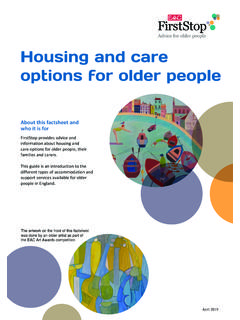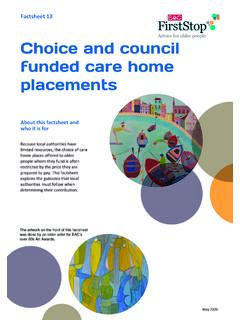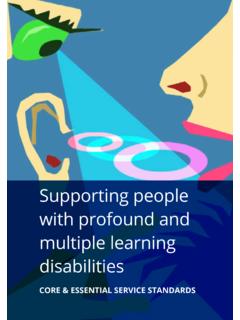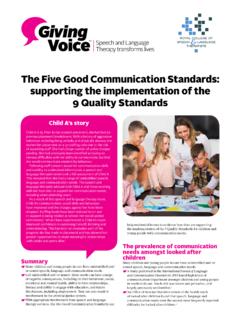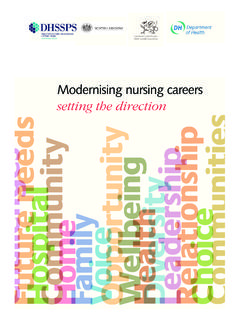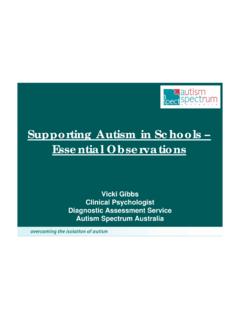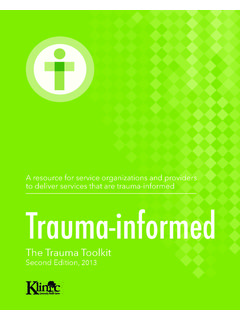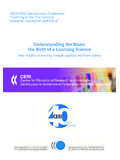Transcription of Older people – independence and well-being - housing & care
1 Public sectorNational reportThe challenge for public servicesOlder people independence andwell-beingTThhee AAuuddiitt CCoommmmiissssiioonnis an independent body responsible for ensuring thatpublic money is spent economically, efficiently and effectively, to achieve high quality local and national services for the public. Our work covers localgovernment, housing , health, criminal justice and fire and rescue an independent watchdog, we provide important information on the quality ofpublic services. As a driving force for improvement in those services, we providepractical recommendations and spread best practice. As an independentauditor, we monitor spending to ensure public services are good value for further information on the work of the Commission please contact:Steve Bundred, Audit Commission, 1 Vincent Square, London SW1P 2PN Tel.
2 020 7828 1212 Older people independence and well -being|Contents1 The challenge21 A changing approach62 Building a strategic approach103 supporting frail Older people154 supporting carers225 Conclusions an agenda for successfulachievement28 Appendix 1 References and acknowledgments33 Audit Commission 2004 First published in February 2004 by the Audit Commission for local authorities and the National Health Service in England & Wales, 1 Vincent Square, London SW1P 2 PNPrinted in the UK for the Audit Commission by CW Print, LoughtonISBN 186240 487 9 Photographs: Cover (l-r): Third Avenue Photography (1 and 3), Joanne O Brian/Report Digital(2), Tunstall Group Ltd (4), John Birdsall Photo Library (5, p27). Older people independence and well -being|The Challenge2 The challenge1We live in an ageing society where people are living longer and the balance of life ischanging.
3 For the first time, there are more people aged over 60 than children under16 in the UK. Most Older people can now look forward to many more years of healthylife after retirement than ever before. Our society is becoming more diverse. It expectsmore from public services. The make up of the Older age group is beginning to reflectthe first generation immigrants of the 1950s and the post-war baby boomers who,during the 1960s, redefined what it means to be shift in proportion, composition and attitudes of the Older age group has profoundimplications for public services. We need to start taking action now to shape things forthe better. Some councils and other agencies are beginning to take imaginative actionin order to meet the challenges of the future but for most, there is a long way to people need an environment that they can shape, thrive and live life to the fullfor as long as possible.
4 The challenge for communities and councils is to be inclusive,to help Older people to stay healthy and active and to encourage their contribution tothe community. Councils need to accept responsibility for investing in opportunitiesand services for Older people ; to see them as full citizens and a resource for society,rather than as dependent on it. Those whose health has begun to fail also deserve toenjoy life as fully as possible and we need to find new ways to support because Older people are seen by many as dependent and frail, rather than ascitizens with a contribution to make, the response of public services is often for Older people have been seen to be predominantly focused on a narrowrange of intensive services that support the most vulnerable in times of crisis; olderpeople are seen as an NHS and social care problems.
5 In fact, at any one time, onlyabout 15 per cent of Older people are in immediate touch with care services:meanwhile the vast majority receive little attention. Resulting in Older people andcarers feeling excluded and ignored, rising pressure on acute services as we fail toprevent crises through early action, and tight gatekeeping that shuts people outrather than including our countries will make decisionsabout adapting to our ageing societies,or these decisions will be made for usby the sheer force of demographicsand economics. It becomes a questionof whether we will manage change, orwhether change will manage us(Ref. 1).5We need a fundamental shift in the way we think about Older people , fromdependency and deficit towards independence and well -being.
6 When they are asked, Older people are clear about what independence means for them and what factorshelp them to maintain it. Older people value having choice and control over how theylive their lives. Interdependence is a central component of Older people s well -being;to contribute to the life of the community and for that contribution to be valued andrecognised. They require comfortable, secure homes, safe neighbourhoods,friendships and opportunities for learning and leisure, the ability to get out and about,an adequate income, good, relevant information and the ability to keep active people want ageism to be tackled. They want to be involved in makingdecisions about the questions that affect their lives and the communities in which theylive.
7 They also want services to be delivered not as isolated elements, but as joined-up provision, which recognises the collective impact of public services on their lives. 7 Public services have a critical role to play in responding to the agenda for olderpeople. Local strategic approaches to Older people and later life must go beyond careservices to tackle the factors that Older people view as central to their lives. 8 Some authorities are already using their community leadership role, working witholder people and with other partner agencies, such as the NHS, Pensions Service andvoluntary organisations, to improve the lives of Older citizens. The Audit Commissionand Better Government for Older people (BGOP) have identified how this can be doneand where several communities are achieving a shift in focus.
8 9 This report, and the more detailed reports that accompany it, sets out the indicators ofgood performance. It is designed to help public bodies in developing a framework forlocal approaches to Older people . We hope it will be useful for all those involved indelivering and planning the range of services Older people use, including electedmembers and Older people themselves. The comprehensive performanceassessment for 2005 will assess the progress made and the impact of localauthorities activities on the well -being of Older people . Additionally, the AuditCommission will continue to contribute with the Commission for Healthcare Audit andInspection (CHAI) and the Commission for Social Care Inspection (CSCI) to the reviewof the National Service Framework (NSF) for Older people (Ref.)
9 2), in particular, thestrand that will focus on the standard that promotes a healthy, active challenge to respond to the needs and aspirations of a large and growing sectionof our community is not a marginal one. Much is straightforward and expectations areunexceptional. It is therefore all the more surprising that comprehensive, systematicapproaches to Older people are still relatively rare. In future, local councils and theirpartners should expect to be judged on their ability to build communities that supportolder people to live active, fulfilling people independence and well -being|The Challenge3 The report11 This report summarises a series of papers that explore the nature of the changerequired from public services.
10 The scope of the report is wide, so it can do no morethan touch on many of the issues facing Older people of all ages, from the majoritywho have no need for care services, but who have a wide range of other concerns, tothe minority of frailer Older people who may need support and care. The supportingpapers provide more depth and detail. The series is available on the AuditCommission s website at people (Exhibit 1).12 Chapter 1 of this report summarises Older people s views about what helps them tolive independent lives. Chapter 2 describes the steps that some authorities are takingto develop a strategic approach to Older people s independence and 3 illustrates how a strong focus on independence can be extended to frailerolder or disabled people , by developing proactive support and through the use of newtechnologies.

